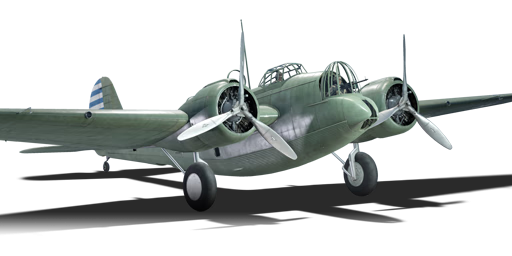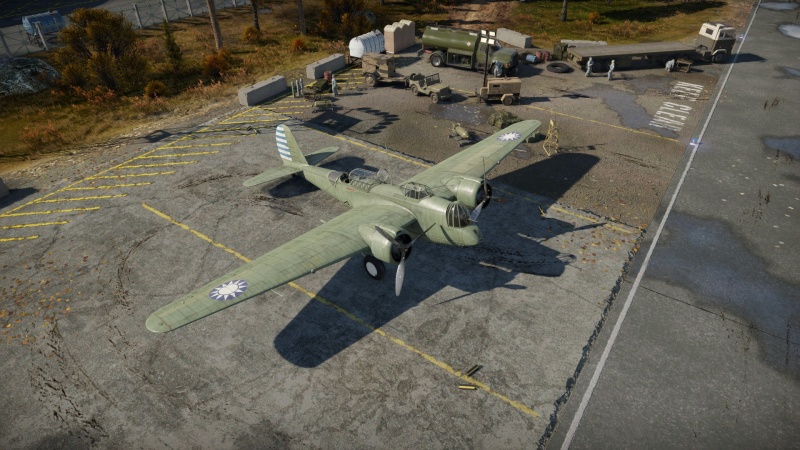Difference between revisions of "Martin 139WC"
(→History) |
|||
| Line 1: | Line 1: | ||
| + | |||
| + | {{About | ||
| + | | about = Chinese Bomber '''{{PAGENAME}}''' | ||
| + | | usage = other versions | ||
| + | | link = Martin 139 (Family) | ||
| + | }} | ||
{{Specs-Card | {{Specs-Card | ||
|code=martin_139wc | |code=martin_139wc | ||
Revision as of 20:12, 18 November 2022
| This page is about the Chinese Bomber Martin 139WC. For other versions, see Martin 139 (Family). |
Contents
Description
The Martin 139WC is a rank I Chinese bomber with a battle rating of 1.3 (AB/RB) and 1.7 (SB). It was introduced in Update 1.91 "Night Vision".
General info
Flight performance
| Characteristics | Max Speed (km/h at 2,438 m) |
Max altitude (metres) |
Turn time (seconds) |
Rate of climb (metres/second) |
Take-off run (metres) | |||
|---|---|---|---|---|---|---|---|---|
| AB | RB | AB | RB | AB | RB | |||
| Stock | 353 | 340 | 7380 | 21.9 | 22.7 | 5.6 | 5.6 | 600 |
| Upgraded | 389 | 370 | 20.1 | 21.0 | 10.5 | 7.7 | ||
Details
| Features | ||||
|---|---|---|---|---|
| Combat flaps | Take-off flaps | Landing flaps | Air brakes | Arrestor gear |
| ✓ | ✓ | ✓ | X | X |
| Limits | ||||||
|---|---|---|---|---|---|---|
| Wings (km/h) | Gear (km/h) | Flaps (km/h) | Max Static G | |||
| Combat | Take-off | Landing | + | - | ||
| 564 | 235 | 328 | 313 | 235 | ~7 | ~3 |
| Optimal velocities (km/h) | |||
|---|---|---|---|
| Ailerons | Rudder | Elevators | Radiator |
| < 200 | < 270 | < 290 | > 307 |
Survivability and armour
The Martin 139WC does not have any armour. There are 4 self-sealing fuel tanks, with 2 in each wing.
Modifications and economy
Armaments
Suspended armament
The Martin 139WC can be outfitted with the following ordnance:
- 6 x 100 kg SAP 100M bombs (600 kg total)
- 6 x 100 kg No.1 bombs (600 kg total)
- 2 x 200 kg No.1 bombs (400 kg total)
- 2 x 250 kg GP 250 bombs (500 kg total)
Defensive armament
The Martin 139WC is defended by:
- 1 x 7.62 mm Browning machine gun, nose turret (600 rpg)
- 1 x 7.62 mm Browning machine gun, dorsal turret (600 rpg)
- 1 x 7.62 mm Browning machine gun, ventral turret (600 rpg)
Usage in battles
As a bomber, the Martin 139WC does the job well. It can easily reach bombing points before interception and can damage a base with two 250 kg bombs, and can then turn away and return to base to rearm. If enemy fighters are at altitude, consider using clouds for cover, or entering a shallow dive towards friendly fighters, or the airfield.
This aircraft works very well defensively and can be very effective when flown with a squadmate. As this bomber is very manoeuvrable, it can out-turn most enemy fighters, but lacks the firepower to deal with them effectively, it has no fixed guns and is only equipped with .30 calibre machine guns, and controlling them manually in a dogfight isn't really a viable option. But when playing with a friend, the Martin 139WC can engage a fighter, and while manoeuvring, can draw the enemy into a low energy state, making it a very easy target to take out.
On your own, you can still comfortably dogfight one-on-one with most German and Italian monoplane aircraft, but if this fight is away from friendlies, another enemy fighter could engage with you, and being such a large target, a 2-on-1 fight likely won't go in your favour. As you are a big target, and with two enemies around you, one is likely going to take out a critical component sooner or later.
Try diving towards friendlies before engaging in a dogfight, the closer you are to your allies, the more likely it is that they'll come to your aid, the further away you are, the more likely it is that an enemy will join the fight instead.
If there are no enemies around later on in the match you can attack light ground targets by manually controlling your nose gunner, just make sure to watch out for any trees or ground hazards as there will be a delay before you can switch back to direct control of the aircraft.
Manual Engine Control
| MEC elements | ||||||
|---|---|---|---|---|---|---|
| Mixer | Pitch | Radiator | Supercharger | Turbocharger | ||
| Oil | Water | Type | ||||
| Controllable | Controllable Not auto controlled |
Controllable Not auto controlled |
Controllable Not auto controlled |
Separate | Not controllable 1 gear |
Not controllable |
Pros and cons
Pros:
- Very manoeuvrable, has an impressively high turn rate for a bomber
- The frontal gunner, while only having a .30 cal, can be used as a manual weapon if you keep the front of the plane on an enemies tail, or for attacking ground targets
- As it's a less well-known aircraft, enemies may not know how to effectively fight it
- It can easily take fire from machine guns on the wings, and in general is fairly survivable
- While having limited fire arcs on the rear turrets, they cover a wide area and can surprise enemies that don't know they're there
Cons:
- It's a large target, and even though the critical components are hard to hit individually, the large wings and tail will accumulate damage over time
- Maximum bombload of 2 x 250 kg bombs is not a lot
- No armour protection at all, leaving it vulnerable to even small-calibre MG.
- Despite its comparatively good speed, most Axis aircraft can catch up to it easily
- Rear gunners have a slightly restricted field of view over the tail, where the gunners can't fire
History
Although the Martin B-10 was made obsolete in late 1930s when Boeing's B-17 won the bid for a new long-range bomber, the overall performance of the B-10 was still sufficient for countries in dire need for high-speed bombers, including the Republic of China which had next to no aviation industry at the time.
Records show that the ROCAF purchased the Martin B-10 (designated the Martin 139WC) in 1936; it was in fact the fastest aircraft on Chinese soil which was at the time mostly biplanes. They served as part of the ROCAF bomber forces and joined the first bombing operations of mainland Japan in 1938 when two bombers took off from Hankou (now a district of Wuhan City) and dropped propaganda leaflets over Kyushu via Ningbo (which was still under Nationalist control at the time) on 19th May 1938. The crew returned safely to Nanchang on the 20th, but any further records of the Martin 139 in the Chinese Theatre are sparse.
Media
- Skins
See also
- Related development
- Aircraft of comparable role, configuration and era
External links
Paste links to sources and external resources, such as:
- topic on the official game forum;
- other literature.
| Glenn L. Martin Company | |
|---|---|
| Attackers | AM-1 |
| Bombers | B-10B · B-26B · PBM-1 · PBM-3 · PBM-5A |
| Jet bombers | B-57A* · B-57B* |
| Export | Martin 139WC · Martin 167-A3 · B-26C |
| * These aircraft were license-built from The English Electric Company Limited who developed and built the British English Electric Canberra. | |
| China bombers | |
|---|---|
| American | Martin 139WC*(␗B-10B) · ␗A-29 · ␗B-25J-30 · ␗PB4Y-2 |
| German | ␗Hs 123 A-1 |
| Soviet | ␗SB 2M-103U · ␗DB-3A · ␗Tu-2S-44 · ␗Tu-4 |
| Japanese | ␗P1Y1 mod. 11 |
| *Export Name | |





